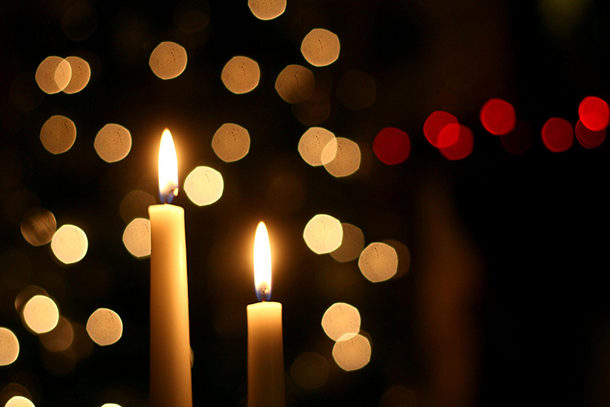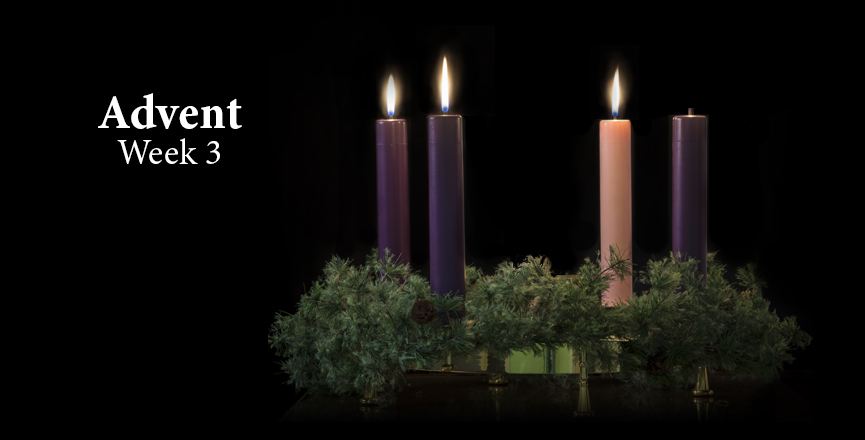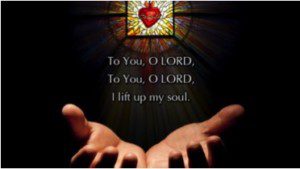
“Song of the Holy Spirit” (Luke 1:68-79)
Second Sunday of Advent, December 9, 2018
We’re well into the season now! Lights, music, TV
commercials, cards in the mail; decorations around the city and around the
neighborhood; shopping lists; eggnog; Christmas is upon us. I love it, as
many of us do. But as much as we love
Christmas, we treasure the story of the birth of our Savior Jesus Christ even
more.
The story of Jesus’
birth is a Holy Spirit story. We can read Luke and clearly see that in
the story of Jesus’ birth, the Holy Spirit is at work. And, when the Holy
Spirit is at work and we respond in faith, then the Spirit lead us into God’s
peace.
The Spirit is mentioned
over and over. The angel who appeared to Mary promised the Holy Spirit
would come upon her (1:35). When Mary’s cousin Elizabeth came to visit,
the Holy Spirit filled her (v.41). Later
in Luke we see the Holy Spirit fill Jesus and lead him into the wilderness to
face Satan (4:1).
This morning we zero in
on Luke 1:67. Zechariah was filled with the Holy Spirit and spoke this
prophecy. Earlier Luke described Zechariah as an aged priest descended
from Abijah and his wife Elizabeth, also elderly and also a descendent of a
priestly line, the line of Aaron. The couple was childless and past
childbearing years. In this particular
year, Zechariah was the one priest chosen to enter the holy of holies on the
Day of Atonement to make the offering on behalf of the nation. Alone in
that sacred space, an angel came to him.
He wasn’t prepared for that!
Members of the clergy
are as shocked and awed by direct encounters with divine beings as lay people
are. He wasn’t ready to meet an angel, but that’s what happened. “Fear overwhelmed him” (1:12) as the angel
told him that his barren wife Elizabeth would have a son who would be named
John and be “filled with the Holy Spirit” (1:15). Zechariah couldn’t believe
it, and said so. The angel was not impressed by his skepticism, and so,
he rendered old Zechariah mute until the miracle baby came.
All who knew Elizabeth
and Zechariah rejoiced with them at their son’s birth even as they marveled at
the old priest’s inability to speak. Their friends and family knew this
child was from God. Still, when
Elizabeth gave the baby the name “John,” the neighbors and relatives called time
out. You can’t name him that. John’s not a family name.
They all looked to silent Zechariah who grabbed a tablet and scrawled out
“J-O-H-N.” He held it up for all to see.
With the baby here, his voice was released. Aloud he said, “His name is John.”
Then, the priest, the
father of the miracle baby, Zechariah, silent the previous 9 months, sang this
song. It was a psalm in the form of Old Testament psalms. The message was the stuff of prophets of
old, word that had not been heard since Malachi, hundreds of years earlier. A
psalm? Yes. A prophecy? Most definitely, in the tradition of Isaiah
and Jeremiah and all the great prophets.
Yet this song of Zechariah was also a song of the Holy Spirit.
Through the priest’s
mouth the Spirit tells what God has done and is about to do. Next, Luke
will tell of the birth of Jesus. John
and Jesus, cousins; one born of a woman after she’s gone through menopause; the
other born of a virgin; both inspiring great songs of faith: John, Zechariah’s
benediction and Jesus, Mary’s magnificat. John preceded Jesus. After Jesus was baptized by John, his public ministry
began, and John encouraged his own followers to leave him and follow
Jesus. Many did including some of the 12
disciples.
This story, flowing
through Zechariah’s song, declares that God has acted. “Blessed be the Lord ...
he has looked favorably upon his people” (1:68). How? “He
has raised up a mighty savior” (v.69). God’s people will be saved from
powerful enemies who hate them. God has shown mercy. God has remembered his covenant with Abraham.
Zechariah sings, because
of what God has done, “we [may] serve him without fear.” Think Adam before the
fall when he and Eve enjoyed complete freedom in their relationship with God in
the garden, even freedom from sin. When we put our trust in this savior
foretold by Zechariah, we are rescued from the chains our own sins impress upon
us.
After praising God for
Jesus, Spirit-inspired Zechariah then sings to his newborn son. “You,
child, will be called prophet of the Most High; for you will go before the Lord
to prepare his ways, to give knowledge of salvation to his people by the
forgiveness of their sins.” In Jesus God has acted so that the
very thing that separates us from God - God’s holiness verse our sinfulness -
is removed. He takes our sins on himself, and puts his righteousness on
us. When we put our trust in Jesus, we
are made right where previously we were flawed. Sin is that serious. In sin, we are destined for death. And we are all sinners. But John the Baptist would come and show us
that in Jesus, God forgives.
Zechariah sang of being
rescued from enemies. The three greatest foes of all people in all times
and place - the three greatest enemies you and I face - are
antagonists who cannot be defeated: sin, Satan, and death. In Christ, we
are safe even from these three evils.
Zechariah closes
singing, “By the tender mercy of our God, the dawn from on high will break upon
us, to give light to those who sit in darkness and in the shadow of death, to
guide our feet onto the way of peace.” Ah yes, the way peace, where the
Spirit leads those who trust in God. In
God’s light, we see the world as it is and ourselves as we truly are,
sinners. Without God, we are lost. The journey to salvation is a free gift, one
full of joy. That’s doesn’t mean it is easy.
Pastor and blogger Alan
Brehm likens what we go through when we step onto God’s path following the
Spirit to the process of refining glass. Touring a glass-blowing factory,
he watched as the glass was heated up to remove impurities and make it
moldable. The furnace was so hot, even at
his safe distance, he felt uncomfortable. The goal was to make the glass
a thing of beauty. The process required
intense heat that would change the glass from impure to pure, from rigid to
pliable.
When we turn to Christ
and put our trust in Christ, we are that glass, heated up, refined, bent,
shaped, molded, and made into something new. God goes to work on us. The Holy Spirit takes up residence in us just
as Jesus takes our impurities, our sins, and re-creates us as right and
acceptable before God. John’s job, as Zechariah stated, was to go before
Jesus, paving the way. Further on in the
story, we see John baptizing people beside the Jordan River (3:3).
God accomplished His
work in the life, teaching, death, and resurrection of the son. God continues
the work of salvation today. The Holy Spirit appeals the hearts of women and
men, drawing them to God’s light.
Of course, when we keep
our gaze fixed on the world around us, we cannot see God’s light or know God’s
peace. When we make life choices based on the values of our current
culture instead of the transcendent values of Heaven, we cannot see God’s light
or know God’s peace. When we hold on to old grudges, refuse to give
grace, and instead view our fellow human beings with malice in our hearts, we
cannot see God’s light and know God’s peace. We have to see the world,
but see it in God’s light.
Jesus has come.
The light is shining. God’s spirit is here. We can accept God’s gift or not. We are
called to repent, to turn from the darkness in the world to God’s light.
This was preached by John the Baptist and taught by Jesus. Turn away from darkness, turn to the light.
Turn away from sin, turn to God.
Turn away from false, impotent saviors, to turn to the one true Lord,
the crucified, resurrected Jesus. We may choose faith in Christ. The Holy Spirit helps us. But even with the Spirit’s help, God allows
us free will. We can turn away from God.
God will not force us to have faith.
To walk God’s way, the
way of peace, we have to be honest about our self-indulgence, our need to
control others, and the aggressions and prejudices that live within us.
We have to present ourselves, the very worst of ourselves fully to
God. We have to go through the Spirit’s
refining fire. We not only hear and tell
the story. We enter it.
We enter the fire and
come out new. We approach as sinners and emerge as people born again, as
new creations. When we hear the song of the Holy Spirit, ... and believe
it, ... and decide to live it, ... then we begin to understand what new life
really means. We start to grasp the peace the Bible promises.
Christmas is great.
The peace of God is a whole lot better. When we hear the Spirit’s son and
allow ourselves to be led into faith, peace is what we get.
AMEN
Works
Cited
Brehm,
Alan. “The Waking Dreamer.” Refining, 1 Jan. 1970,
thewakingdreamer.blogspot.com/2012/12/refining.html.




